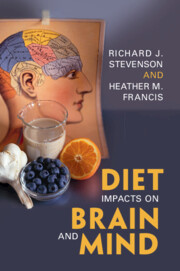Book contents
- Diet Impacts on Brain and Mind
- Diet Impacts on Brain and Mind
- Copyright page
- Contents
- Figures
- Tables
- Preface and Acknowledgements
- Chapter 1 Introduction
- Chapter 2 Pregnancy, Infancy and Development
- Chapter 3 Acute Effects of Food Intake
- Chapter 4 Chronic Effects of Food Intake
- Chapter 5 Dietary Neurotoxins
- Chapter 6 Neuroprotective Effects of Diet
- Chapter 7 Food-Related Drugs and Food as a Drug
- Chapter 8 Starvation and Caloric Restriction in Adults
- Chapter 9 Essential Nutrient Deficiencies in Adults
- Chapter 10 Implications and Conclusions
- References
- Index
Chapter 7 - Food-Related Drugs and Food as a Drug
Published online by Cambridge University Press: 02 February 2023
- Diet Impacts on Brain and Mind
- Diet Impacts on Brain and Mind
- Copyright page
- Contents
- Figures
- Tables
- Preface and Acknowledgements
- Chapter 1 Introduction
- Chapter 2 Pregnancy, Infancy and Development
- Chapter 3 Acute Effects of Food Intake
- Chapter 4 Chronic Effects of Food Intake
- Chapter 5 Dietary Neurotoxins
- Chapter 6 Neuroprotective Effects of Diet
- Chapter 7 Food-Related Drugs and Food as a Drug
- Chapter 8 Starvation and Caloric Restriction in Adults
- Chapter 9 Essential Nutrient Deficiencies in Adults
- Chapter 10 Implications and Conclusions
- References
- Index
Summary
This chapter focusses on addiction to food-related drugs and whether food can be thought of as a drug. Section 7.2 considers alcohol, its behavioural effects and how these might arise in the brain. Consequences of chronic use on brain and behaviour are also examined, both for adult neurological sequelae and for foetal brain development. Section 7.3 explores caffeine and theobromine, the former being the world’s most widely used drug. Whether caffeine’s cognitive-behavioural benefits arise from it ameliorating withdrawal in chronic users or whether it has some cognitive enhancing properties in everyone is examined. The biological basis of these cognitive-behavioural effects are also reviewed, including how caffeine may affect striatal dopamine. Section 7.5 examines food addiction. A number of conceptual issues are discussed, namely obesity as an endpoint of addiction, whether there can be addiction to a biological need, and the appropriateness of parallels to substance abuse and behavioural models of addiction.
Keywords
- Type
- Chapter
- Information
- Diet Impacts on Brain and Mind , pp. 203 - 249Publisher: Cambridge University PressPrint publication year: 2023

